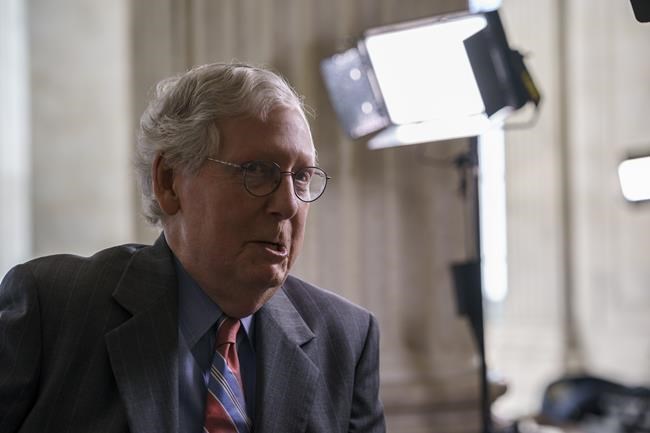WASHINGTON (AP) — Aiming to preserve a fragile bipartisan deal on infrastructure, President Joe Biden said Saturday he didn’t mean to suggest he would veto the bill unless Congress also passed a larger package to expand the social safety net.
Speaking on Thursday when the deal was reached, Biden had said the two packages needed to move in “tandem" and “If they don’t come, I’m not signing. Real simple.”
Those comments sparked criticism from some Republican lawmakers who were party to the deal. Biden sought Saturday to clarify his position.
“My comments also created the impression that I was issuing a veto threat on the very plan I had just agreed to, which was certainly not my intent,’ he said.
Biden had been holding out hope of reaching a bipartisan deal on infrastructure — a years-long Washington priority — with Democrats pursuing the larger second bill on party lines through the budget reconciliation process.
THIS IS A BREAKING NEWS UPDATE. AP’s earlier story follows below.
WASHINGTON (AP) — The White House is trying to put President Joe Biden's bipartisan infrastructure deal back on track after Republican senators balked at his demand to pair the nearly $1 trillion plan with an even bigger investment package.
Tensions appeared to have cooled Saturday after White House negotiators Steve Ricchetti and Louisa Terrell assured senators that Biden remained enthusiastic about the deal, even though he had said he would not sign a bill unless it was accompanied by trillions more in a separate measure. They said the president will seek to make a forceful public case for the initial agreement.
According to a person familiar with the aides' calls to lawmakers, Biden's team portrayed the fallout from his remarks as nothing more than the back-and-forth that can happen in Washington negotiations. Biden plans to pitch the deal in trips around the country and is confident it will become law, said this person, who was not authorized to publicly discuss the private conversations and spoke on condition of anonymity.
“My hope is that we’ll still get this done,” said Sen. Rob Portman of Ohio, the lead Republican negotiator, in an interview Friday with The Associated Press.
“It’s really good for America. Our infrastructure is in bad shape,” he said. “It’s about time to get it done.”
The sudden swings point to the difficult path ahead for what promises to be a long process of turning Biden's nearly $4 trillion infrastructure proposals into law.
What had been a celebratory moment for Biden and a group of 10 senators this past week with the announcement of a rare bipartisan accord was jolted by Biden's insistence at a news conference that he would not sign this initial bill unless Congress also passed his broader package of proposed investments.
The two measures were always expected to move together through Congress: the bipartisan plan and a second bill that would advance under special rules allowing for passage solely with majority Democrats votes. But the president then conditioned one on the other.
Some senators felt “blindsided” by what they said was a shift in their understanding of his position.
The White House didn't explicitly walk back Biden's remarks, but the message conveyed in the latest round of calls and public statements sought to allay senators' concerns.
In Biden's call to the Democratic negotiator, Arizona Sen. Kyrsten Sinema, the president said he looked forward to signing both bills, the White House said.
Not all senators were swayed by the White House outreach, which came after a tumultuous past month of on-again, off-again negotiations over Biden's top legislative priority.
White House press secretary Jen Psaki said senators should not have been surprised by the two-track strategy. “That hasn’t been a secret. He hasn’t said it quietly. He hasn’t even whispered it,” she said at her briefing Friday.
Psaki said the president plans to stand by the commitment he made to the senators. “And he expects they’ll do the same,” she said.
The Democrats’ two-track strategy has been to consider both the bipartisan deal and their own more sweeping priorities side by side, as a way to assure liberals the smaller deal won't be the only one.
But Biden’s pledge to essentially veto or refuse to sign the bipartisan accord without the companion package, now eyed at nearly $6 trillion in child care, Medicare and other investments, was an additional step that throws the process into doubt.
A bipartisan accord has been important for the White House as it tries to show centrist Democrats, including Sinema, Sen. Joe Manchin, D-W.Va., and others that it is working with Republicans before Biden tries to push the broader package through Congress.
“There’s a lot of conversations taking place right now as to what the president meant," said Sen. Bill Cassidy, R-La., in an interview with a Fox affiliate in New Orleans shared by his office.
Cassidy noted that the president may have misspoken and said he hoped "it won’t be as if we crafted something just to give the president a point of leverage to get something that Republicans disagree with.”
Ten Republican senators would be needed to pass the bipartisan accord in the 50-50 Senate, where 60 votes are required to advance most bills.
While the senators in the bipartisan group are among some of the more independent-minded lawmakers, known for bucking their party’s leadership, it appears criticism by Senate Republican leader Mitch McConnell of Biden’s approach could peel away GOP support.
___
Associated Press writers Darlene Superville, Josh Boak, Kevin Freking and Dan Sewell contributed to this report.
Lisa Mascaro And Zeke Miller, The Associated Press



